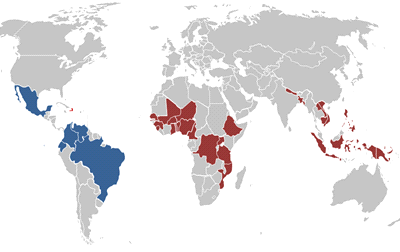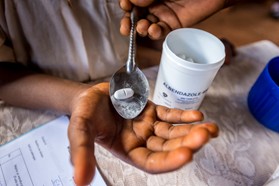
|
Africa |
Asia |
America |
|
|
Burkina Faso |
Mozambique |
Bangladesh |
Haiti |
|
Benin |
Niger |
Cambodia |
Regional |
|
Cameroon |
Nigeria |
Indonesia |
Brazil |
|
DRC |
Sierra Leone |
Nepal |
Ecuador |
|
Ethiopia |
Tanzania |
Philippines |
Guatemala |
|
Ghana |
Togo |
Vietnam |
Mexico |
|
Guinea |
Uganda |
|
Venezuela |
|
Mali |
|
|
|
The USAID Neglected Tropical Diseases (NTD) Program prioritizes NTDs that can be controlled or eliminated through safe and effective treatment strategies and complimented by pharmaceutical donation programs. These diseases include
- Lymphatic Filariasis (elephantiasis)
- Trachoma
- Onchocerciasis (river blindness)
- Schistosomiasis
- Soil Transmitted Helminthes (intestinal worms)
Since its inception in 2006, the U.S. Congress has appropriated $586 million to the USAID NTD Program. The NTD Program has grown to support 25 countries in Africa, Asia, and Haiti as well as six countries in a regional program in the America's.
Over 1 billion treatments have been provided towards achieving the World Health Organization's 2020 NTD Goals.
The Problem, the Solution
More than 1 billion people worldwide suffer from one or more painful, debilitating tropical diseases. These NTDs disproportionately impact poor and rural populations, cause severe sickness and disability, compromise mental and physical development, contribute to childhood malnutrition, reduce school enrollment, and hinder economic productivity. Treatment of at-risk populations for approximately 4-6 years can lead to elimination or control of these diseases. USAID provides critical funding that allows countries to distribute drugs safely and efficiently and to increase the number of treatments until national coverage is reached.
Progress
Many of the USAID supported countries have already seen great reductions in the presence of lymphatic filariasis. Eighteen of these countries have been able to stop mass treatment for lymphatic filariasis in all or parts of the country. Over 127 million people are living in these areas and are now no longer at risk of infection. Fifteen of these countries have also had similar success in fighting blinding trachoma, and now over 54 million people live in areas that have reached such low disease prevalence that they no longer need mass treatment.
|
NTD Program Highlights 2006 - 2015 |
|---|
|
1.4 billion treatments delivered (cumulative) 687.2 million people reached (cumulative) $11.1 billion in donated drugs 367,000 community drug distributers trained each year (average) |
Investments
The USAID NTD Program prioritizes country-level platforms that make mass treatment possible. These core investments include:
Disease mapping
Drug distribution
Monitoring and evaluating program impact
The Program also recognizes that there are important needs in addition to mass treatment. To that end, USAID is making complementary investments in several key areas including;
-
Morbidity management and improving services that aim to alleviate the suffering of individuals facing the debilitating consequences of blinding trachoma and lymphatic filariasis,
-
operational research to develop strategies to overcome challenges and accelerate progress towards elimination, and
- the development of products and strategies to reduce the number of years that mass treatment is required.
Partners

The USAID NTD Program collaborates with a wide variety of partners such as the United Nations, bilateral partners, foundations, non-governmental organizations, faith-based organizations and the private sector.
Host country Ministries of Health and pharmaceutical companies are the core most important partners, without which the NTD Program would not be possible.
Host country Ministries of Health own and manage their national NTD programs with USAID support, focusing on capacity building and filling technical and financial gaps in delivering the required treatments to all communities.
Generous drug donations from pharmaceutical companies have topped $11.1 billion worth of drugs for NTD control to the countries where USAID supports mass treatment campaigns. Six of the drugs needed to treat NTDs are donated by:
Eisai - DEC (diethylcarbamazine)
GlaxoSmithKline - albendazole
Johnson & Johnson - mebendazole
Merck - Mectizan®
Merck Serono - Praziquantel
Pfizer - Zithromax®
For more information on USAID's NTD Program, please visit NeglectedDiseases.gov







Comment
Make a general inquiry or suggest an improvement.